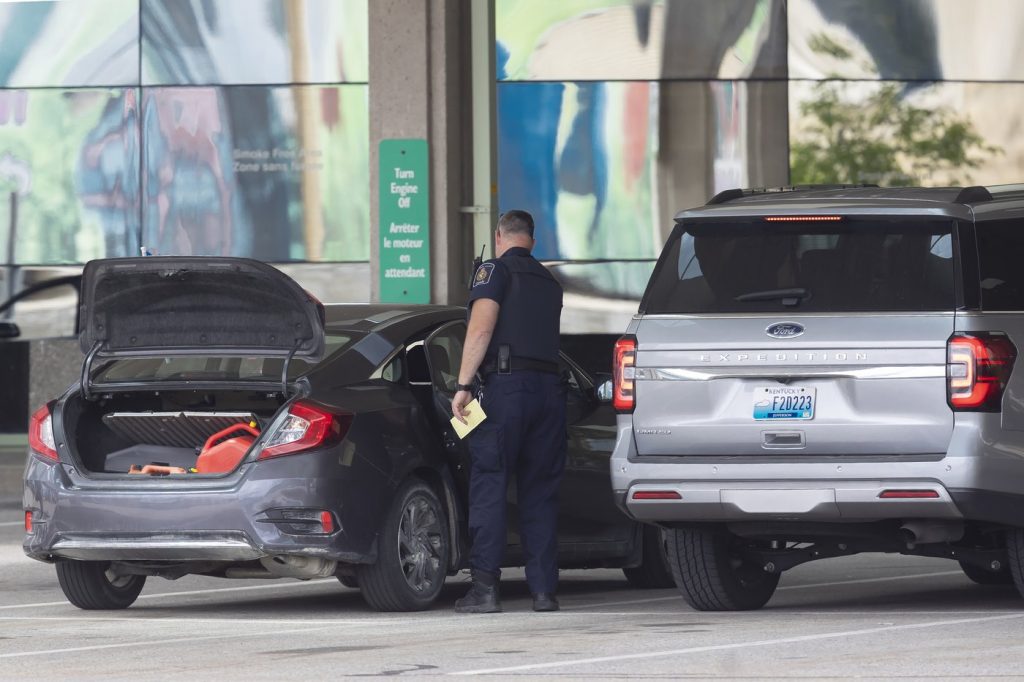OTTAWA – The federal union representing Canada's front-line customs and immigration officers has expressed significant concerns regarding staffing levels at the Canada Border Services Agency (CBSA) in light of U.S. President Donald Trump's impending tariff threats. Trump's executive order is set to implement a 25 percent tariff on all Canadian goods, along with a lower 10 percent levy on energy, beginning on Tuesday.
Despite Canada's efforts to comply with Trump's demands for enhanced border security and a diplomatic outreach by Canadian officials to Washington, Trump confirmed on Monday that the tariffs will be enforced as originally planned. As a result, the CBSA is under pressure to effectively manage border security amid these developments.
Mark Weber, the national president of the Customs and Immigration Union, highlighted that the CBSA is currently short approximately 2,000 front-line officers. This staffing shortage is particularly pronounced at certain ports of entry, and Weber emphasized the urgent need for an additional training center. "Currently, the CBSA only has the one training center which can pump out under 600 new recruits a year, which is about what our attrition is," he stated. The lack of sufficient training facilities complicates efforts to increase personnel numbers meaningfully.
The CBSA currently employs about 17,226 public servants, of which approximately 8,500 are assigned as front-line personnel. Comparatively, in 2021, the agency had around 15,500 employees, including roughly 8,100 front-line officers. In 2012, these figures were about 13,000 employees and 7,200 front-line officers, indicating a concerning trend in staffing levels over the years.
Conservative Leader Pierre Poilievre voiced the necessity for the federal government to hire a minimum of 2,000 additional border agents. He also suggested extending the CBSA's powers to encompass the entire border rather than limiting them to designated crossings, a request echoed by the union. Additionally, the union has raised alarms about budget cuts tied to the government's strategy to refocus federal spending, noting a net decrease of $48.5 million for the CBSA between 2024 and 2025.
Weber expressed hope that the "renewed focus" on border security will motivate the government to bolster staffing levels. Although optimistic about a new $1.3 billion border security plan, he remains uncertain about how much of that budget will specifically address staffing issues.
The current staffing situation has taken a toll on officers' ability to perform thorough inspections. Weber pointed out, "Our staffing levels have gotten to a point where we're kind of depending on technologies, self-declaration, things like that to hopefully interdict. I think we need to kind of get back into the business of actually interacting face-to-face with travellers and doing those searches and asking questions."
According to the CBSA's data, the agency reported 36,225 seizures of illegal goods such as drugs and firearms in the 2024-25 fiscal year. Recent data regarding seizures from the last few months has not yet been released. In contrast, the agency documented 62,055 seizures in 2023-24, 51,376 in 2022-23, 52,349 in 2021-22, and a higher figure of 75,291 in 2020-21.
Rebecca Purdy, a spokesperson for the CBSA, affirmed that the agency remains vigilant in combating the illegal drug trade, particularly with substances like fentanyl and the precursors used for producing synthetic drugs.
Weber further stressed that increasing staff at the border would signal Canada’s commitment to border security and lead to enhanced interdiction efforts. He recounted visiting ports of entry where staff levels had plummeted, noting, "You’ve got a lineup of trucks or cars with four people there." This raises critical questions about the effectiveness of inspections and how much potential evidence might be overlooked due to insufficient resources to manage the workload.
In conclusion, the urgency for staffing bolsters at CBSA is paramount to ensuring safe and efficient border management as Canada navigates challenges posed by new tariffs and increasing security demands.










